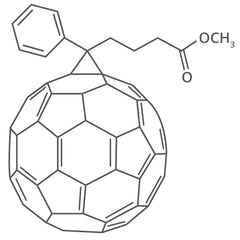High Quality Electron Accepting Material
Enables rapid and efficient charge transfer and exciton dissociation
Specifications | MSDS | Literature and Reviews
PCBM (CAS number: 160848-22-6), in its full form, is [6,6] phenyl-C61-butyric acid methyl ester. The butyric acid methyl ester and phenyl functionality means it is a solubilized version of the buckminsterfullerene C60.
PCBM is one of the most commonly used electron accepting materials in organic photovoltaic devices. It is also used as an electron transport material in bulk heterojunction perovskite–PCBM solar cells. The solubility enables PCBM to be dissolved in common solvents used for donor polymers, allowing the simultaneous casting of polymer and fullerene and the formation of an efficient bulk heterojunction. When used in a device with a donor polymer, PCBM enables rapid and efficient charge transfer and exciton dissociation [1], and has a high electron mobility [2].
The 99% purity PCBM is recommended for general OPV use, and the 99.5% purity PCBM is recommended for OFET applications where the highest crystallization and mobility is required.
Soluble Fullerene
Efficient charge transfer and excition dissociation
Popular Material
For OPVs and perovskite solar cells
Tailored High Purity
>99% or >99.5% for different applications
Worldwide Shipping
Quick and reliable shipping around the world
PCBM from Ossila was used in the high-impact paper (IF 18.81), Towards Efficient Integrated Perovskite/Organic Bulk Heterojunction Solar Cells: Interfacial Energetic Requirement to Reduce Charge Carrier Recombination Losses, M. Daboczi et al., Adv. Funct. Mater., 2001482 (2022); DOI: 10.1002/adfm.202001482.
General Information
| CAS Number | 160848-22-6 |
|---|---|
| Chemical Formula | C72H14O2 |
| Full Name | [6,6]-Phenyl-C61-butyric acid methyl ester |
| Molecular Weight | 911 g/mol |
| HOMO / LUMO | HOMO = -6.1 eV, LUMO = -3.7 eV |
| Synonyms |
C60PCBM PC60BM PC61BM [60]PCBM 3’H-cyclopropa[1,9][5,6]fullerene-C60-Ih-3′-butanoic acid 3′-phenyl methyl ester |
| Classification / Family | Fullerenes, Organic semiconducting materials, Organic Photovoltaics, Polymer Solar Cells, Perovskite Solar cells, OFETs, Electron transport layer materials |
Chemical Structure

Pricing
| Product Code | Purity | Quantity | Price |
|---|---|---|---|
| M111 | >99% | 250 mg | £190 |
| M111 | >99% | 500 mg | £300 |
| M111 | >99% | 1 g | £410 |
| M111 | >99% | 5 g |
£1810 |
| M112 | >99.5% | 100 mg | £180 |
| M112 | >99.5% | 250 mg | £350 |
| M112 | >99.5% | 500 mg | £590 |
| M112 | >99.5% | 1 g | £810 |
| M2482A1 | >99.9% | 100 mg | £210 |
| M2482A1 | >99.9% | 250 mg | £410 |
| M2482A1 | >99.9% | 500 mg | £690 |
| M2482A1 | >99.9% | 1 g | £1180 |
MSDS Documentation
Learn More
 Polymer-Fullerene Bulk Heterojunction Solar Cells
Polymer-Fullerene Bulk Heterojunction Solar Cells
Polymer-fullerene bulk heterojunction (BHJ) solar cells are based on blends of semiconducting polymers and fullerene derivatives, such as PCBM. It is described as a bulk heterojunction as it involves a blend of two materials with differing energy band gaps, forming a dispersed, interpenetrating network.
Read more...Literature and Reviews
- Photoinduced electron transfer from a conducting polymer to a buckminsterfullerene, N. S. Sariciftci et al., Science, 258 (1992), 1474–1476; DOI: 10.1126/science.258.5087.1474.
- Study of field effect mobility in PCBM films and P3HT:PCBM blends, E. Hauff et al., Sol. Energy Mater. Sol. Cells, 87 (2005), 149–156; DOI: 1016/j.solmat.2004.06.014.
